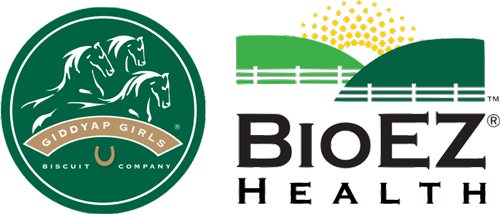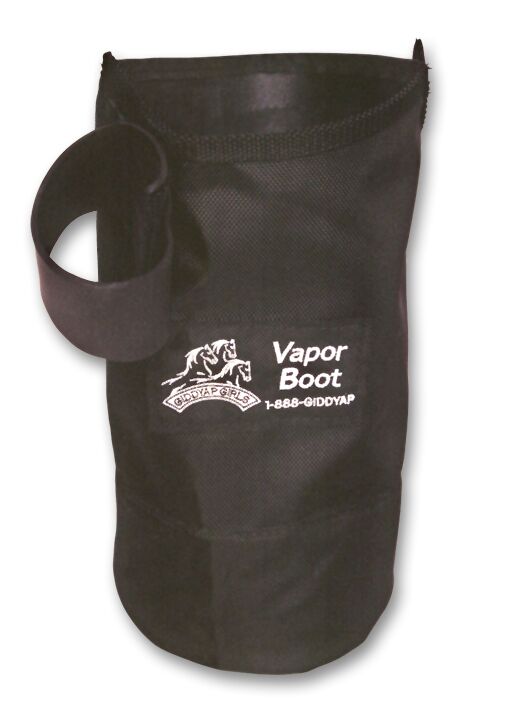BioEZ® VF-Advanced Digestive Optimizer
General Uses & Good For:
BioEZ®-VF Advanced can help a wide range of wellness & digestive challenges and be a lasting solution to persistent conditions like chronic diarrhea, poor body condition, healthful weight, and colic.
Senior Horse Care
- Healthy Aging
- Active Seniors
- Geriatric Care
- Mastication Issues
- End of Life Care
Digestive Upset / Hindgut Imbalances
- FWS / Fecal Water Syndrome
- Suffering from Repeated Episodes of Diarrhea / Chronic Diarrhea
- Severe or Projectile Diarrhea
- Hind-Gut Acidosis
- Prone to Re-Occurring Colic
Convalescing / Veterinary
- Recovering from Illness or Injury
- Pre & Post Surgery / Medical - Get Healthy Beforehand
- Accelerate Recovery
- To Stimulate the Immune System
Compromised Horse Care
- Organ Diseases or Functions
- Cancers
- Horses on Long Term Medication
- Metabolic Horses
Health & Supervised Care
- During & After Antibiotic Therapy / DeWorming
- Parasitic Infections
- Bacterial or Viral Infected
- Inactivates Mycotoxins
- NSAIDs – Toxicity from on-going usage
Performance / Stress
- Heavy Training
- Competition / Show Stress Minimize
- Horses that Travel
- Ulcer Prevention & Treatment
- Younger Horses Leveling Up in Training
For General Wellness - Peak Health & Performance
- Prevent Digestive Upsets - Seasonal Transitions – Weather/Pasture/Hay Changes
- Routine Changes
- Unexplained Weight Loss
- Disposition – Behavioral problems
- For Foals to Establish Healthy Gut Flora – Prevent Scourers
- Metabolic Issues – No Sugar added - EMS, PSSM, PPID




What makes BioEZ® VF-Advanced Better:
- Highest Feed to Energy Conversion
- Unequaled Absorption of Nutrients from Feed & Supplements
- Veterinary Strength Formula
- Exclusive Microbial Cultures
- Enhances Stamina & Performance
- Activates a Robust innate Immune Response
- Accelerates Recovery
- Nourishes and Maintains the Growth & Function of Beneficial Bacteria throughout the Gastrointestinal Tract
- Reduces Risk of Hindgut Acidosis via Better Foregut Starch Conversion
- Supports Healing of Stomach Lining and Gastrointestinal Tissues
- Increases Gut Epithelium Surface Area (more surface area for better nutrient absorption)
- Balances pH
- Reduces Digestive Tract Inflammation
- Conditions Gut Walls for Optimal Hindgut Health & Function
- Degrades and Flushes Toxins, Mycotoxins and Pathogenic Bacteria
- Prevents Pathogens from Binding to Gut Wall & Proliferating
- Restores and Strengthens a Balanced Vibrant Healthy Microbiome
- Resolves a wide range of Digestive Challenges including FWS/FFW, Chronic Diarrhea, Loose Stool and Recurrent Colic.
- Increased Appetite and Better Weight Management
- Improves Temperament and Attitude
- Promotes Muscle Recovery
- No added Sugar
- Palatable Taste ensures Consumption
- Improves Overall Wellness


Features
Concentrated Powerful & Dynamic - this Veterinary Strength Formula was scientifically prepared with cutting edge ingredients for Maximum Digestive Support and Optimal Wellness.
Exclusive Microbials
BioEZ®-VF Advanced contains exclusive Microbial Probiotics and Proprietary Digestive Enzymes. This product is able to convert an extraordinary amount nutrients - from feed and supplements - for Energy, Muscle, Recovery, Digestive and Overall Health.
Enzyme Mode of Action
- Breakdown Feedstuffs and Supplements into smaller bits for Better Assimilation
- Help ‘Condition’ Gut Wall for enhanced Nutrient Uptake
- Liberate ‘peptides’ causing an Amino Acid release
- Activate high quality plant protein for Muscle and Muscle Recovery
- Provide Energy via hydrolyzing plant fiber substrate converting complex carbohydrates and starches to VFA to carry out metabolism.
- Release and solubilize a plentiful source of Quality Minerals from plant cell walls for absorption and uptake
- Inactivate Mycotoxins
Probiotic Mode of Action:
- Improve Protein Absorption and Utilization, offering numerous health benefits, including digestive and immune health
- Deliver anti-oxidants that maintain healthy cell membranes and accelerate recovery after exercise.
- Supports healing of stomach lining and colonic ulceration by supplying nutrients to heal gastrointestinal tissues.
- Stimulates enzymes that promote sugar and starch digestion in the foregut, thru reducing the risk of hindgut acidosis and upset caused by NSC’s that make it to the hindgut impacting microflora balance.
- Exclusive microbials nurture and develop Healthy Larger Digestive Villi.... thus providing more surface area for greater Nutrient Absorption
- Probiotics interaction with horse’s T-cells ( and B-Cells ) activate immune response to foreign antigen presences.
- Assist in preventing certain types of inflammation in gut wall
- Aids immune response by producing a massive amount of extracellular compounds ( colicins, bacteriocins, peptides ) that act as microbial pathogen inhibitors, and prevent proliferation.
- Maintains normal GI tract environment, which may eliminate or reduce the severity and duration of acute and chronic diarrhea
- Mitigates adhesion of pathogenic bacteria to intestinal walls, binding to them and help flush them harmlessly out thru the feces.
- Sustains the growth and function of beneficial bacteria throughout the digestive system.
- Probiotic Microbials balance a complex hindgut microbiome, fostering a healthy gut wall surface area for maximum nutrient absorption. Live Yeasts re-establish Depleted Microflora population help balance fore and hindgut pH levels.
- Bacillus coagulans
- Bifidiobacterium thermophilum
- Enterococus faecium
- Propiobacterium shermanii
- Lactobacillus plantarum
- Lactobacillus acidophilus
- Saccharomyces boulardii
- Saccharomyces cerevasie
- Fourteen Amplified Broad Spectrum Digestive Enzymes in: Acidic, Alkaline and Neutral enhance normal enzymatic activity improving the synthesis of starches and proteins and the digestion of soluble fats and fibers into smaller, more bioavailable bits. Proprietary.
- Prebiotics – Nourish & Improve Probiotic Efficiencies- Support a Healthy GI tract from stomach to hindgut.
- BioUptake™ Complex - Highly Bioavailable & Digestive Track Stable –Improves Global Nutrient Uptake and Overall Effectiveness of VF-Advanced BioEZ®
- B-Vitamins 1,7, 9,12 – Improve Probiotic Function
- Biotin – B7 – Enhances Enzyme Activity
- L-Cystine– Enhances availability of Microbials
- Phyto-Therapy Oils – Tackle Pathogenic Bacteria from a natural, safe ‘Plants as Medicine’ angle…. via exclusion and pili disruption. As a side benefit, Horse Love the aroma…. which Encourages consumption.




Directions for use:

Storage and Handling:
- For optimum stability, store in a cool dry area out of direct sunlight and in a sealed container.
- Never feed moldy or rancid product.
- Refrigeration not Required
- For Oral use in Horses
- Buyer assumes all responsibility of use, storage and handling of the product.
Guarantees

Disclaimer
It is recommended that you consult your Veterinarian prior to adding BioEZ®-VF , or any supplement to your horse's daily regimen. When health issues arise, always seek the advice of a licensed veterinarian who can help you choose the correct course of action for your horse. Supplements are intended to maintain healthy systems and support recover and healing. They are not intended to treat or cure illness or injury. GGBC Inc. makes no claims or warranties expressed or implied and will not be responsible for consequential or incidental damages.

WHY USE A SUPPLEMENT PRODUCT CONTAINING ENZYMES AND PROBIOTICS
Feed (feedstuff) typically accounts for the majority of animal production costs. Some estimates under many common management schemes or practices suggest over 70% of direct costs are meeting the nutritional requirements of the animal. Efforts to reduce such costs either by utilizing less desirable (e.g. nutritionally inferior (lacking) or containing recalcitrant ingredients) feed components or making increase use (e.g. digestibility) of existing feedstuff are consistent with the economics of animal ownership. Traditional and historic application of hormone promoters, feed applied antibiotics, and/or chemical additives fairly consistently enhanced animal performance but legitimate concerns of product wholesomeness by customers have discouraged such use.
There are several potentially important performance enhancing components that have been shown to substitute, at least partially, supplements and digestive aids. These include most commonly plant extracts, prebiotic natural and synthetic compounds, exogenously supplied enzymes, and, probiotic microbes. Published research literature is replete with carefully controlled studies showing the often variable performance impact of applying these alternative supplements in animal husbandry. However, it is apparent that certain combinations of these more ‘natural’ supplements will more consistently enhance animal feed conversion efficiency and overall performance.
Laboratories at universities and at private companies over the past four decades have worked on developing combinational products that when formulated to a targeted animal species can promote both better health (e.g. resistance to pathogens), enhance body condition and overall production performance.
To increase availability of energy which resides principally in the form of complex carbohydrates such as cellulose, hemicellulose, complexed starch, xylan sheets, et cetera - the animal’s digestive tract (and its resident microorganisms) must gain access to these plant components. Complex structures of such carbohydrates often stuck together by the plant’s glue (e.g. lignin) limits availability of these compounds. Plant tissues have devised complex structures mostly in the cell walls which greatly limit water hydration and therefore gut microbial or gut enzyme access. To make such tissues available to the digestive processes we recommend inclusion of enzymes such as cellulase, xylanase, amylase, mannanase, and glucanase. By converting such plant components into smaller entities and affording water solubilities the host animal gains energy (via sugars) to carryout animal metabolism. Also it is important to note that such enzymes will assist in the liberation of a rich supply of minerals in the plant cell walls or in a chemical form that animals cannot digest (e.g. phytate acid)
In common feedstuff, often proteins are denatured (e.g. collapsed) by processing (e.g. heating) and as such rendered difficult to extract or solubilize from the plant materials or much more difficult to hydrolyze to amino acids. To make such protein readily available to the digestive processes of the host we recommend inclusion of several types of proteases (e.g. serine, metallo, cysteine, aspartic types). These enzymes can facilitate the ‘tweezing” of protein molecules or various length peptides from the plant materials and provide a high quality source to the host. Furthermore, all plant based feedstuff unavoidably contains some level of fungal pathogens or mycotoxin contamination. Such mycotoxins can have a dramatic negative impact on animal health and digestive physiology. Fungi are in fact the most abundant microorganism on planet earth and have been shown to exist in every growth environment in existence. Therefore, no matter how careful or capable the producer of fiber is, fungi are present in all plant based agricultural commodities. By including certain types of enzymes as listed above (and others) it has been convincingly demonstrated that several forms of mycotoxins (e.g. aflatoxin, deoxynivalenol, patulin, others) can be inactivated using certain oxidoreductases, lipases and/or proteases, respectively. Our products include such enzyme activities.
Lastly, there exists in nearly all feedstuff certain component ‘factors’ that limit or inhibit host animal digestive physiology. To break down such feedstuff anti-nutritional factors (such as arabinoxylans, phytate, certain beta-glucans….) we recommend inclusion of enzymes including xylanase, glucosidase, phytase and others. By converting or breaking down these factors in the digesta the host animal can more successfully and completely utilize the more abundant nutrients.
In summary: Enzyme supplementation will assist in managing the variable nutrient availability of seasonal feedstuff, may minimize the need to use antibiotics, better optimize animal feed efficiency, improve the overall and consistency of animal health, and, perhaps reduce both the volume and mineral based toxicity of animal waste.




Numerous species of naturally occurring microorganism (e.g. bacterial, yeast/mold types) are nominally found on (or even within) plant tissues. Although it is not mechanistically known exactly the absolute importance or a detailed and complete mode of action of this association, it has been suggested that such species afford competitive advantages to plants. When considering non-pathogenic microbial species that might provide a physiological impact on its host they are considered to be probiotic. Whether the impact is dependent on microbial viability is somewhat uncertain but evidence is accumulating that the microbes physiology (e.g. the ‘bag’ containing metabolites) is more critical to its impact than the ability to divide (grow or be viable).
Nevertheless, probiotic species, when added, have been convincingly shown to alter and often improve a number of aspects related to animal performance. In general such microorganisms have fairly consistently been shown to improve the digestion and essential nutrient availability, afford benefits in animal health by preventing pathogen proliferation and increase feed conversion. Probiotics supplement carry out these production benefits using several tactics.
Probiotic mode of action minimally includes enzymatic (those synthesized in the cytosol) conversion of certain feedstuff sugars to organic acids (to be used as energy) that can better condition the digestive apparatus (e.g. gut wall, caecum, other). They specifically produce a variety of secreted and extracellular acting enzymes that can aid in the breakdown of mostly inaccessible plant nutrients such as certain plant proteins again affording increased solubility and accessibility to gut wall uptake structures and gut microbes or degrade directly certain types of mycotoxins found in the feedstuff. Furthermore they produce extracellular compounds (e.g. colicins, bacteriocins, other small peptides) that can act directly on microbial pathogens as inhibitors. Also, by competing directly for gut located and available nutrients, probiotics can successfully out compete or reduce pathogenic organisms.
It is the above mentioned reason that we have included certain collections of probiotic species in our supplementation products. For instance, several Lactobacillus species have been shown to produce powerful anti-pathogen compounds when supplemented. In fact, it has been convincingly shown that these species produce many very important compounds included bacteriocins (several types and forms), gamma amino butyric acid, ornithine, several types of exopolysaccharides, mannitol, 3-phenyllactic acid, 2-hydroxyisocaproic acid, et cetera, that clearly can have a large and profound impact on animal physiology. The process of pathogen exclusion (for instance of Escherichia coli, or Clostridia ssp) has been very successfully accomplished using several types of Bacillus species in animals after a trial pathogen challenge.
Even though it is the intention of our products to be offered as a supplement daily, there are well documented cases where inoculation even infrequently can cause persistent changes in the microbial populations of the gut. The total numbers of species and relative populations have been lengthily altered when the correct types of probiotics are added. Our products provides a collection of other probiotics including Saccharomyces ssp and Propionibacterium ssp to both aid in the production of colicin molecules and enlarge pili structures to both increase nutrient adsorption and prevent pathogen binding to the gut well. Such prevention of binding will result in ‘pass through’ or rapid ‘wash out’ of such pathogens. It is also likely that inclusion of such beneficial probiotic species assists in the prevention of certain types of inflammation events in the gut wall.
There are very likely numerous additional interactions between the intestinal gut lining of their host and the physiology of probiotics. Evidence is plentiful proving that these interactions can and do support the immunological response of the animal to or against foreign antigen invasion. Such interactions although not fully defined or understood clearly point to a key aspect of the advantage of probiotic supplementation. In fact, it has been convincingly shown that probiotic supplementation increases the height of gut epithelium (specifically the villi) and therefore dramatically increases digestive interactive surface area. Probiotic interaction with the host’s T cells (and perhaps B cells) has been shown to greatly specify and activate the host’s immune response to foreign antigen presence. Such notions point to the fundamental impact of probiotics on the development of animal disease and pathogen resistance. The young animal’s gut development is most certainly assisted by allowing earlier maturation and increased feed conversion efficiency and the animal is better protected against pathogen invasion.
In summary: Probiotic supplementation will assist in managing nutrient balancing at time of feeding lower quality feed that possesses few adequate amounts of essential nutrients and apparently higher numbers of potentially dangerous pathogens. Better and more consistent health and performance is also expected largely because of the many metabolites that the probiotics synthesize and provide to the host animal and therefore contributes to the expected gains in management practice flexibility.
Dr. C.L Hodgers, Formulator
Premium Digestive Support for Horses that are:
- Dynamic Performers
- Race Horses
- Traveling Competitors
- Active Seniors
- Energetic Training / Leveling Up
- Naturally, want the Very Best
- Compromised Health / Veterinary Care
- Geriatric not Masticating
- End of Life Care
- Recovering from Illness or Injury
- Convalescing after Surgery or Hospitalization ( faster recovery )
Essential for Horses that are:
- Recent or current treatment with NSAIDs or Antibiotics
- Afflicted with FWS/FFW ( product is shown to mitigate or solve )
- Horses at Risk to Grain Overload & Hindgut Acidosis
- Previously Treated for Gastric or Colonic Ulcers
- Suffering with Digestive Imbalances / Chronic Diarrhea or Recurrent Colic
- Prior History of Sour Attitude or Digestive Issues
What is FWS/FFW ?
Fecal Water Syndrome ( FWS ) also known as Free Fecal Water ( FFW ) in horses is considered a separate condition from diarrhea or loose stools.
FWS is characterized as a horse passing fecal liquid separately from normal solid manure and can occur before, during and after, or separately from normal defecation.
Although underlying causes are not fully known at this time, the issue is thought to be fairly common, and there appears to be no effect on general health associated with the condition, but it can cause skin irritation and it becomes a management and appearance issue.





















